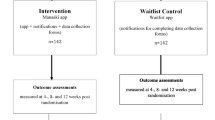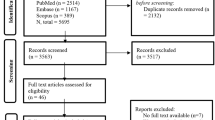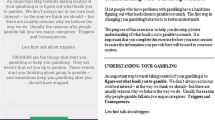Abstract
Purpose of Review
Problem gambling can have profound consequences for affected individuals, yet only a small proportion of people with problem gambling seek treatment. Mobile phone applications (apps) may provide an effective and scalable therapeutic option. The purpose of this study was to evaluate publicly available mobile apps aimed at improving problematic gambling behavior.
Recent Findings
To date, there are no published studies that have evaluated the quality of publicly available smartphone apps for problem gambling in the USA. There is thus a significant gap in knowledge of existing apps for addressing problem gambling.
Summary
This study included a review of 14 problem-gambling-specific apps. Apps that incorporated cognitive-behavioral therapy concepts and in-app communities were associated with better aesthetics and information quality scores. Additionally, in-app communities were associated with better engagement scores. Our results highlight the importance of evidence-based and engaging features in apps designed to help people with problem gambling.

Similar content being viewed by others
Data Availability
Data are available from the corresponding author upon reasonable requests.
References
Papers of particular interest, published recently, have been highlighted as: • Of importance •• Of major importance
Potenza MN, Balodis IM, Derevensky J, et al. Gambling disorder. Nat Rev Dis Primers. 2019;5:51. https://doi.org/10.1038/s41572-019-0099-7. This provides a comprehensive overview on gambling disorder: its prevalence, genetic, neurobiological and environmental aetiology, and treatment.
Potenza MN, Fiellin DA, Heninger GR, et al. Gambling. J Gen Intern Med. 2002;17:721–32. https://doi.org/10.1046/j.1525-1497.2002.10812.x.
Organization WH. ICD-11: International classification of diseases (11th revision). Retrieved from https://icdwhoint/2019.
Bruneau M, Grall-Bronnec M, Vénisse J-L, et al. Gambling transitions among adult gamblers: a multi-state model using a Markovian approach applied to the JEU cohort. Addict Behav. 2016;57:13–20.
Kessler RC, Hwang I, LaBrie R, et al. DSM-IV pathological gambling in the National Comorbidity Survey Replication. Psychol Med. 2008;38:1351–60.
Pilver CE, Potenza MN. Increased incidence of cardiovascular conditions among older adults with pathological gambling features in a prospective study. J Addict Med. 2013;7:387–93. https://doi.org/10.1097/ADM.0b013e31829e9b36.
Potenza M, Koran L, Pallanti S. The relationship between obsessive-compulsive and impulse control disorders: a current understanding and future research directions. Psychiatry Res. 2009;170:22–31.
Potenza MN. Should addictive disorders include non-substance-related conditions? Addiction. 2006;101:142–51.
Horvath AT, Yeterian J. SMART recovery: Self-empowering, science-based addiction recovery support. J Groups Addict Recover. 2012;7:102–17.
Cowlishaw S, Merkouris S, Dowling N, et al. Psychological therapies for pathological and problem gambling. Cochrane Database of Systematic Reviews. 2012. https://doi.org/10.1002/14651858.CD008937.pub2. This summarizes existing behavioral therapies for problem and pathological gambling.
Yau YH, Potenza MN. Gambling disorder and other behavioral addictions: recognition and treatment. Harv Rev Psychiatry. 2015;23:134–46. https://doi.org/10.1097/hrp.0000000000000051.
Menchon JM, Mestre-Bach G, Steward T, et al. An overview of gambling disorder: from treatment approaches to risk factors. F1000Research. 2018;7
Carlbring P, Smit F. Randomized trial of internet-delivered self-help with telephone support for pathological gamblers. J Consult Clin Psychol. 2008;76:1090.
Petry NM, Ammerman Y, Bohl J, et al. Cognitive-behavioral therapy for pathological gamblers. J Consult Clin Psychol. 2006;74:555. This provides evidence-based guidelines on using CBT for problem and pathological gambling.
Potenza MN, Steinberg MA, McLaughlin SD, et al. Gender-related differences in the characteristics of problem gamblers using a gambling helpline. Am J Psychiatry. 2001;158:1500–5.
Slutske WS. Natural recovery and treatment-seeking in pathological gambling: results of two US national surveys. Am J Psychiatry. 2006;163:297–302.
Gainsbury S, Hing N, Suhonen N. Professional help-seeking for gambling problems: awareness, barriers and motivators for treatment. J Gambl Stud. 2014;30:503–19. https://doi.org/10.1007/s10899-013-9373-x.
Suurvali H, Cordingley J, Hodgins DC, et al. Barriers to seeking help for gambling problems: a review of the empirical literature. J Gambl Stud. 2009;25:407–24. https://doi.org/10.1007/s10899-009-9129-9.
Petry NM, Ginley MK, Rash CJ. A systematic review of treatments for problem gambling. Psychol Addict Behav. 2017;31:951.
Toomey E, Hardeman W, Hankonen N, et al. Focusing on fidelity: narrative review and recommendations for improving intervention fidelity within trials of health behaviour change interventions. Health Psychol Behav Med. 2020;8:132–51. https://doi.org/10.1080/21642850.2020.1738935.
Sholomskas DE, Syracuse-Siewert G, Rounsaville BJ, et al. We don’t train in vain: a dissemination trial of three strategies of training clinicians in cognitive-behavioral therapy. J Consult Clin Psychol. 2005;73:106–15. https://doi.org/10.1037/0022-006x.73.1.106.
Oikonomidi T, Vivot A, Tran V-T, et al. A methodologic systematic review of mobile health behavior change randomized trials. Am J Prev Med. 2019;57:836–43. https://doi.org/10.1016/j.amepre.2019.07.008.
Tofighi B, Chemi C, Ruiz-Valcarcel J, et al. Smartphone apps targeting alcohol and illicit substance use: systematic search in in commercial app stores and critical content analysis. JMIR Mhealth Uhealth. 2019;7:e141831. https://doi.org/10.2196/11831.
Iribarren SJ, Akande TO, Kamp KJ, et al. Effectiveness of mobile apps to promote health and manage disease: systematic review and meta-analysis of randomized controlled trials. JMIR Mhealth Uhealth. 2021;9:e21563. https://doi.org/10.2196/21563.
Rathbone AL, Prescott J. The use of mobile apps and SMS messaging as physical and mental health interventions: systematic review. J Med Internet Res. 2017;19:e295. https://doi.org/10.2196/jmir.7740.
Anthes E. Mental health: There’s an app for that. Nature. 2016;532:20–3. https://doi.org/10.1038/532020a.
Grundy Q. A review of the quality and impact of mobile health apps. Annual Review of Public Health. 2022;43:117–34. https://doi.org/10.1146/annurev-publhealth-052020-103738. This review highlights the consequences of having untested, non-evidence-based mHealth apps.
Swire-Thompson B, Lazer D. Public health and online misinformation: challenges and recommendations. Annu Rev Public Health. 2020;41:433–51. https://doi.org/10.1146/annurev-publhealth-040119-094127.
Aronowitz S, Meisel ZF. Addressing stigma to provide quality care to people who use drugs. JAMA Network Open. 2022;5:e-146980-e. https://doi.org/10.1001/jamanetworkopen.2021.46980.
Abroms LC, Padmanabhan N, Thaweethai L, et al. iPhone apps for smoking cessation: a content analysis. Am J Prev Med. 2011;40:279–85. https://doi.org/10.1016/j.amepre.2010.10.032.
Amagai S, Pila S, Kaat AJ, et al. Challenges in participant engagement and retention using mobile health apps: literature review. J Med Internet Res. 2022;24:e35120. https://doi.org/10.2196/35120.
Druce KL, Dixon WG, McBeth J. Maximizing engagement in mobile health studies: lessons learned and future directions. Rheumatic Disease Clinics North Am. 2019;45:159–72. https://doi.org/10.1016/j.rdc.2019.01.004.
Hawker CO, Merkouris SS, Youssef GJ, et al. A smartphone-delivered ecological momentary intervention for problem gambling (gamblingless: curb your urge): single-arm acceptability and feasibility trial. J Med Internet Res. 2021;23:e25786. https://doi.org/10.2196/25786.
Humphrey G, Chu JT, Ruwhiu-Collins R, et al. Adapting an evidence-based e-learning cognitive behavioral therapy program into a mobile app for people experiencing gambling-related problems: formative study. JMIR Form Res. 2022;6:e32940. https://doi.org/10.2196/32940.
Pfund RA, Whelan JP, Meyers AW, et al. The use of a smartphone application to complete therapeutic homework in cognitive-behavioral therapy for gambling disorder: a pilot study of acceptability and feasibility. J Technol Behav Sci. 2020;5:156–63. https://doi.org/10.1007/s41347-019-00123-9.
Khazaal Y, Monney G, Richter F, et al. «Jeu-contrôle», rationnel d’une application de soutien aux limites de jeux. [mHealth app for gambling disorder: Rational and description.]. Journal de Thérapie Comportementale et Cognitive. 2017;27:129–37. https://doi.org/10.1016/j.jtcc.2017.05.003.
So R, Furukawa TA, Matsushita S, et al. Unguided chatbot-delivered cognitive behavioural intervention for problem gamblers through messaging app: a randomised controlled trial. J Gambl Stud. 2020;36:1391–407. https://doi.org/10.1007/s10899-020-09935-4.
Ridley KW, Amy Coleman, Mathew. Win big fast! An evaluation of mobile applications available in Australia for problem gambling. J Gambling Issues. 2020;45. https://doi.org/10.4309/jgi.2020.45.6. This summarizes features identified in 42 existing mHealth apps for problem gambling in Australia.
Brownlow L. A review of mHealth gambling apps in Australia. Journal of Gambling Issues. 2021. This summarizes 17 existing mHealth problem-gambling-specific apps available in Australia.
Stoyanov SR, Hides L, Kavanagh DJ, et al. Mobile App Rating Scale: a new tool for assessing the quality of health mobile apps. JMIR mHealth uHealth. 2015;3:e27. https://doi.org/10.2196/mhealth.3422.
Moseley I, Roy A, Deluty A, et al. Evaluating the quality of smartphone apps for overeating, stress, and craving-related eating using the mobile application rating scale. Curr Addict Rep 2020;7. https://doi.org/10.1007/s40429-020-00319-7
Salazar A, de Sola H, Failde I, et al. Measuring the quality of mobile apps for the management of pain: systematic search and evaluation using the Mobile App Rating Scale. JMIR Mhealth Uhealth. 2018;6:e10718. https://doi.org/10.2196/10718.
Torous J, Bucci S, Bell IH, et al. The growing field of digital psychiatry: current evidence and the future of apps, social media, chatbots, and virtual reality. World Psychiatry. 2021;20:318–35. https://doi.org/10.1002/wps.20883.
Best D, Sondhi A, Brown L, et al. The Strengths and Barriers Recovery Scale (SABRS): relationships matter in building strengths and overcoming barriers. Frontiers in Psychology. 2021;12. https://doi.org/10.3389/fpsyg.2021.663447
Pettersen H, Landheim A, Skeie I, et al. How social relationships influence substance use disorder recovery: a collaborative narrative study. Subst Abuse. 2019;13:1178221819833379. https://doi.org/10.1177/1178221819833379.
Palomäki J, Lind K, Heiskanen M, et al. Predicting online problem gambling treatment discontinuation: new evidence from cross-validated models. Psychology of Addictive Behaviors. 2022:No Pagination Specified-No Pagination Specified. https://doi.org/10.1037/adb0000875
Gainsbury SM. Review of self-exclusion from gambling venues as an intervention for problem gambling. J Gambl Stud. 2014;30:229–51. https://doi.org/10.1007/s10899-013-9362-0.
König LM, Attig C, Franke T, et al. Barriers to and facilitators for using nutrition apps: systematic review and conceptual framework. JMIR Mhealth Uhealth. 2021;9:e20037. https://doi.org/10.2196/20037.
Funding
This work was supported in part through a gift from the Mohegan Sun Casino to Yale University. Mohegan Sun Casino had no involvement in any component of this manuscript, including the conception, design, or analysis of this work. LYM and JML were supported by T32-funded postdoctoral training fellowships from the National Institutes of Health (NIDA grants T32DA019426 and T32DA007238, respectively). The views presented in this manuscript are those of the authors and do not necessarily reflect those of the funding agencies.
Author information
Authors and Affiliations
Contributions
All authors contributed to the study conception and design. Data collection and analysis were performed by LYM, JML, VHD, and GCY. All authors contributed to the manuscript and have approved the final version of the submitted manuscript.
Corresponding author
Ethics declarations
Conflict of Interest
The authors declare no competing interests with respect to the content of this manuscript. BDK has received personal fees from CBT4CBT, LLC outside the submitted work; and has received research support from the Mohegan Sun Casino. MNP has consulted for Opiant Therapeutics, Game Day Data, Baria-Tek, the Addiction Policy Forum, AXA and Idorsia Pharmaceuticals; been involved in a patent application with Yale University and Novartis; received research support from the Mohegan Sun Casino and the Connecticut Council on Problem Gambling; consulted for legal and gambling entities on issues related to impulse-control disorders and addictions; has edited journals and journal sections; has given academic lectures in grand rounds, CME events and other clinical or scientific venues; and has generated books or book chapters for publishers of mental health texts. The other authors report no disclosures.
Human and Animal Rights
This article does not contain any studies with human or animal subjects performed by any of the authors. Since this work involved collection and analysis of data regarding phone apps and not individual persons, this work does not meet the criteria for Human Subjects Research, so ethics approval was not necessary.
Additional information
Publisher's Note
Springer Nature remains neutral with regard to jurisdictional claims in published maps and institutional affiliations.
LYM and JML contributed equally to this work and share first authorship. VHD and GCY contributed equally to this work and share second authorship.
Supplementary Information
Below is the link to the electronic supplementary material.
Rights and permissions
Springer Nature or its licensor (e.g. a society or other partner) holds exclusive rights to this article under a publishing agreement with the author(s) or other rightsholder(s); author self-archiving of the accepted manuscript version of this article is solely governed by the terms of such publishing agreement and applicable law.
About this article
Cite this article
McCurdy, L.Y., Loya, J.M., Hart-Derrick, V.R. et al. Smartphone Apps for Problem Gambling: a Review of Content and Quality. Curr Addict Rep 10, 178–186 (2023). https://doi.org/10.1007/s40429-023-00479-2
Accepted:
Published:
Issue Date:
DOI: https://doi.org/10.1007/s40429-023-00479-2




